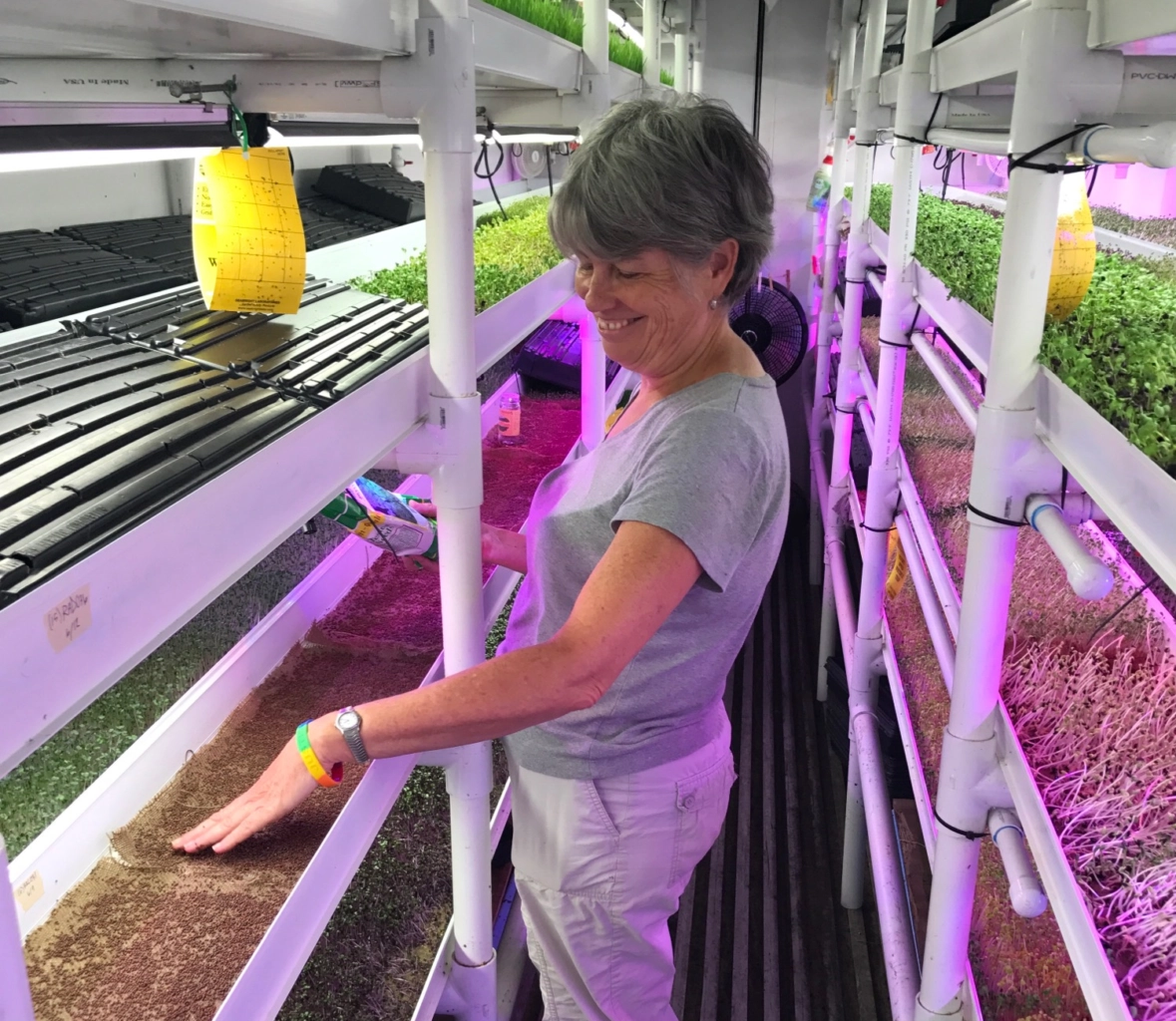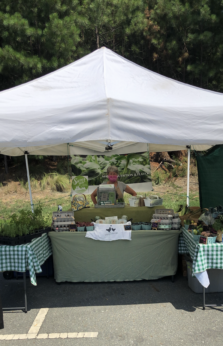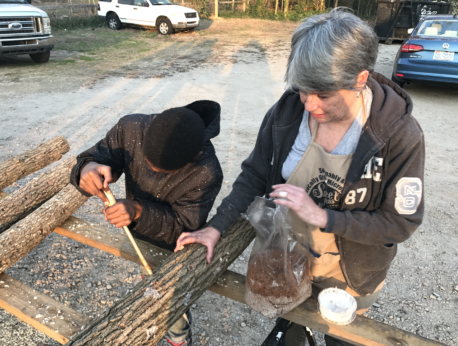Meet the Farmer Who Pivoted in Her Fifties From a Law Firm to a Microgreens Farm
Tami Purdue waited until later in life to start her urban agriculture career. Now, she runs a thriving microgreens farm and community garden.
Meet the Farmer Who Pivoted in Her Fifties From a Law Firm to a Microgreens Farm
Tami Purdue waited until later in life to start her urban agriculture career. Now, she runs a thriving microgreens farm and community garden.

Tami Purdue with her microgreens.submitted.
Tami Purdue didn’t grow up on a farm or have a background in growing food. For twenty years, she worked as a legal manager for a prominent law firm in Raleigh, North Carolina, working 60-80 hours a week. “Work was my whole world,” she says. “I knew it wasn’t good for my health.” Already in her fifth decade, she was ready for a change and a new career path.
In 2014, a weekend gardening workshop taught by Will Allen of Growing Power changed everything. Her goal for the class was to learn how to improve her soil and figure out how to compost. “Why was my soil so bad that I couldn’t grow tomatoes correctly?” she wanted to know.
Planting a tray of microgreens—nutrient-dense seedlings that are typically ready in three to seven weeks—and taking them home was also part of the curriculum. When her arugula tray successfully germinated, a seed was literally planted. She loved the quick results and cute miniature results. “I can do this,” she thought. So, she continued to grow them, eventually drafting a business plan, out of which Sweet Peas Urban Gardens was born. “I’m a microgreen farmer because of arugula,” she says. “The workshop turned out to be life-changing.”
She assumed chefs would be interested in microgreens’ nutrient density. She was (and still remains) surprised that they were more interested in the microgreens’ beautiful hues. “Do you have black microgreens?” they would ask. “What about blue?”

Happy to have a local grower in Raleigh instead of flying microgreens in from California, many chefs she approached ended their contracts that day and hired her to grow them. Purdue adapted and experimented with germinating intriguing colorful varieties to chefs’ needs. Currently, Purdue grows around 55 varieties, including amaranth, red acre cabbage, red veined sorrel, pea shoots and cilantro flowers.
She began volunteering at the Well Fed Community Garden, where she learned more about gardening, local food systems and people making changes in the Raleigh food community. She also realized how much she didn’t know about agriculture terms. For example, she needed to learn the definition of specialty crops. “I thought it meant interesting stuff like ginger and turmeric and that microgreens were in it,” she says. What she found opened her eyes to how the system incentivizes commodity crops, which are more often grown to feed livestock, rather than to feed people. “The only [crops] that aren’t specialty are the commodity crops, which are sugar and wheat and corn and soy,” she says. “They are the ones that get the funding. It’s a screwed-up mess.”
A year after starting her microgreens business, she purchased a crop box, a modified and automated shipping container, and set it up in her backyard. One person running the shipping container five days a week for three to four hours a day produces three tons of microgreens annually, she says.
When the pandemic hit, restaurant orders stopped and farmers markets shut down, but the changes brought a silver lining for Purdue. A business in Raleigh had previously been offering local and seasonal produce boxes, but it had pivoted to cater to customers’ desire for all types of produce year-round, sometimes importing it from other states and countries. The produce boxes were no longer representative of the local region, and Purdue saw an opportunity in the market: to provide a produce subscription box filled only with produce from local growers and offering microgreens, too. She started with 15-20 regular subscribers, and she now has more than 75. “Folks love the produce, and the added little microgreen pack in their boxes is the icing on the cake,” she says.
She works seven days a week and laughs that she still works 80 hours a week, despite leaving her demanding former job. “[Farming] is what runs my life. It’s when I get up to when I go to bed,” she says. In addition to growing microgreens and coordinating subscription boxes, she also hosts workshops at Sweet Peas Urban Gardens on subjects such as how to grow microgreens or mushrooms, and she hosts local school visits and other events. Despite the workload, she’s all in on her second career. “It keeps me wanting to get up in the morning and do my part. I love it.”
Part of Purdue’s passion is credited to her belief in the power of local and community-based food systems. “We can solve all of the things that are just so blatantly wrong,” she says. “Carbon footprint, food insecurity, clean food, so people aren’t sick— it’s just so in our face … It’s not rocket science to see the answer to it. [We need] more diversity in the food system and less mega food distributors.”

Purdue is now in her sixties, but she’s not slowing down. She has big plans on the horizon for the next two or three years, including having the farm pay for itself and helping more farmers get paid through the produce subscription boxes. She recently received a grant from the USDA Office of Urban Agriculture and Innovation, which will help her hire a zoning expert to work with her municipality to change the rules so you can operate in your municipality.
She says that if she can get involved in urban farming, anyone can. “I did it. I’m an old lady with no agriculture experience. You can do it, too.”
Follow us
This work is licensed under a Creative Commons Attribution-NoDerivatives 4.0 International License.
Want to republish a Modern Farmer story?
We are happy for Modern Farmer stories to be shared, and encourage you to republish our articles for your audience. When doing so, we ask that you follow these guidelines:
Please credit us and our writers
For the author byline, please use “Author Name, Modern Farmer.” At the top of our stories, if on the web, please include this text and link: “This story was originally published by Modern Farmer.”
Please make sure to include a link back to either our home page or the article URL.
At the bottom of the story, please include the following text:
“Modern Farmer is a nonprofit initiative dedicated to raising awareness and catalyzing action at the intersection of food, agriculture, and society. Read more at <link>Modern Farmer</link>.”
Use our widget
We’d like to be able to track our stories, so we ask that if you republish our content, you do so using our widget (located on the left hand side of the article). The HTML code has a built-in tracker that tells us the data and domain where the story was published, as well as view counts.
Check the image requirements
It’s your responsibility to confirm you're licensed to republish images in our articles. Some images, such as those from commercial providers, don't allow their images to be republished without permission or payment. Copyright terms are generally listed in the image caption and attribution. You are welcome to omit our images or substitute with your own. Charts and interactive graphics follow the same rules.
Don’t change too much. Or, ask us first.
Articles must be republished in their entirety. It’s okay to change references to time (“today” to “yesterday”) or location (“Iowa City, IA” to “here”). But please keep everything else the same.
If you feel strongly that a more material edit needs to be made, get in touch with us at [email protected]. We’re happy to discuss it with the original author, but we must have prior approval for changes before publication.
Special cases
Extracts. You may run the first few lines or paragraphs of the article and then say: “Read the full article at Modern Farmer” with a link back to the original article.
Quotes. You may quote authors provided you include a link back to the article URL.
Translations. These require writer approval. To inquire about translation of a Modern Farmer article, contact us at [email protected]
Signed consent / copyright release forms. These are not required, provided you are following these guidelines.
Print. Articles can be republished in print under these same rules, with the exception that you do not need to include the links.
Tag us
When sharing the story on social media, please tag us using the following: - Twitter (@ModFarm) - Facebook (@ModernFarmerMedia) - Instagram (@modfarm)
Use our content respectfully
Modern Farmer is a nonprofit and as such we share our content for free and in good faith in order to reach new audiences. Respectfully,
No selling ads against our stories. It’s okay to put our stories on pages with ads.
Don’t republish our material wholesale, or automatically; you need to select stories to be republished individually.
You have no rights to sell, license, syndicate, or otherwise represent yourself as the authorized owner of our material to any third parties. This means that you cannot actively publish or submit our work for syndication to third party platforms or apps like Apple News or Google News. We understand that publishers cannot fully control when certain third parties automatically summarize or crawl content from publishers’ own sites.
Keep in touch
We want to hear from you if you love Modern Farmer content, have a collaboration idea, or anything else to share. As a nonprofit outlet, we work in service of our community and are always open to comments, feedback, and ideas. Contact us at [email protected].by Lauren David, Modern Farmer
February 16, 2024
Modern Farmer Weekly
Solutions Hub
Innovations, ideas and inspiration. Actionable solutions for a resilient food system.
ExploreExplore other topics
Share With Us
We want to hear from Modern Farmer readers who have thoughtful commentary, actionable solutions, or helpful ideas to share.
SubmitNecessary cookies are absolutely essential for the website to function properly. This category only includes cookies that ensures basic functionalities and security features of the website. These cookies do not store any personal information.
Any cookies that may not be particularly necessary for the website to function and are used specifically to collect user personal data via analytics, ads, other embedded contents are termed as non-necessary cookies.
You know what Tami needs? …NOTHING! What a great roll model!! Thank you for featuring such a cool person.
AWESOMENESS!!!
I’m am happy for her! I hope to make a life of farming. It is a dream for me also.
What is the process to qualify for a grant to grow Microgreens as a business. I am a senior who is growing 7 varieties of microgreens